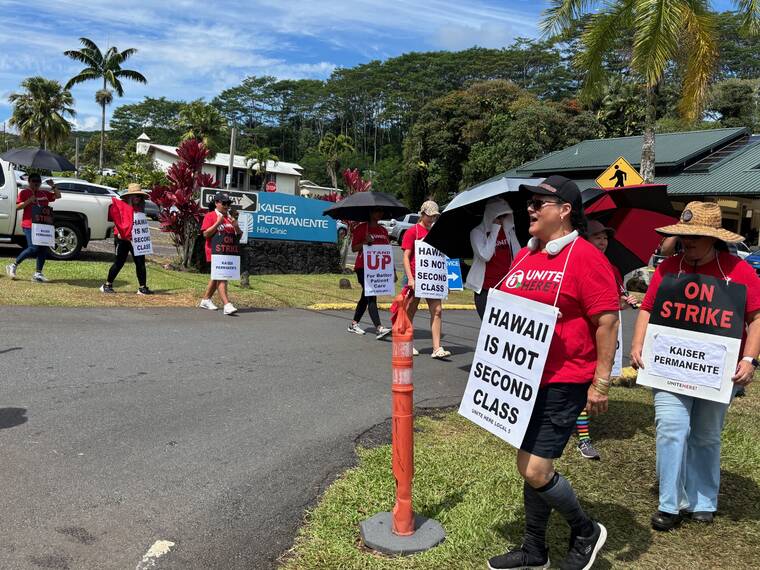Employees of Kaiser Permanente in Hilo, Hawaii, are currently engaged in a labor strike, demanding better staffing levels, pay, and benefits. The strike, organized by the Alliance of Health Care Unions and led by Unite Here Local 5, began on October 3, 2023, following failed contract negotiations that have been ongoing since April. Approximately 15 picketers gathered outside the Hilo clinic, chanting slogans such as “No contract, no peace!” and “Scabs, go home!”
The labor dispute involves over 1,900 Kaiser workers statewide, with many picketing at various locations across Hawaii and California. The employees argue that their current wages do not reflect the high cost of living in Hawaii, where workers reportedly earn up to 30% less than their mainland counterparts in similar roles. The previous contract expired on September 30, 2023, leading to the current strike.
Keokilani Keliikuli-Teixeira, an OB/GYN medical assistant with two decades of experience at the Hilo clinic, expressed the anxiety surrounding the strike. “It’s very concerning and … very scary,” she said, highlighting the pay discrepancies that have prompted the action. Keliikuli-Teixeira noted that about 30 picketers have been rotating in shifts to maintain presence from 7:30 a.m. to 5:30 p.m. daily.
Cade Watanabe, Financial Secretary and Treasurer of Local 5, emphasized that the strike is not solely about wages but also about addressing critical staffing and workload issues. “It’s not just about making sure we get wages that allow us to survive in these very expensive islands,” he stated. The union is committed to continuing negotiations, although Keliikuli-Teixeira believes that a resolution is unlikely by the end of the current strike.
The issue of management decisions affecting local workers has also been raised. Keliikuli-Teixeira pointed out that the merger of Kaiser Permanente’s Hawaii region with its Southern California region has distanced decision-makers from the on-ground realities of Hawaii employees. “It’s a lot of number-crunching, a lot of watching how much money we were making them. We’re not people anymore,” she remarked.
Carole Abe, a primary care medical assistant at the Hilo clinic for 23 years, echoed these sentiments, adding that she joined the strike primarily due to pay concerns. Both Abe and Keliikuli-Teixeira support families, with Abe acknowledging the challenge of living paycheck to paycheck, stating, “It’s unfair. Hawaii’s not second class, you know?”
Kanoe Arai, a licensed practical nurse in pediatrics at the Hilo clinic for 10 years, described the additional responsibilities staff members take on due to staffing shortages. “We do, like, three times as much as them,” she said, comparing their workload to that of mainland Kaiser clinics.
In response to the ongoing strike, Kaiser Permanente has assured patients that most of their facilities remain operational. A statement from the organization indicated that they expect to resume full operations next week and expressed gratitude for the employees who continue to support operations during the strike. Kaiser officials emphasized their commitment to providing high-quality care to their members.
As the strike continues, the voices of the picketers highlight the pressing need for equitable treatment and fair wages in the healthcare sector. The outcome of this labor action could have significant implications not only for Kaiser workers but also for the broader conversation surrounding healthcare employment standards in Hawaii.
